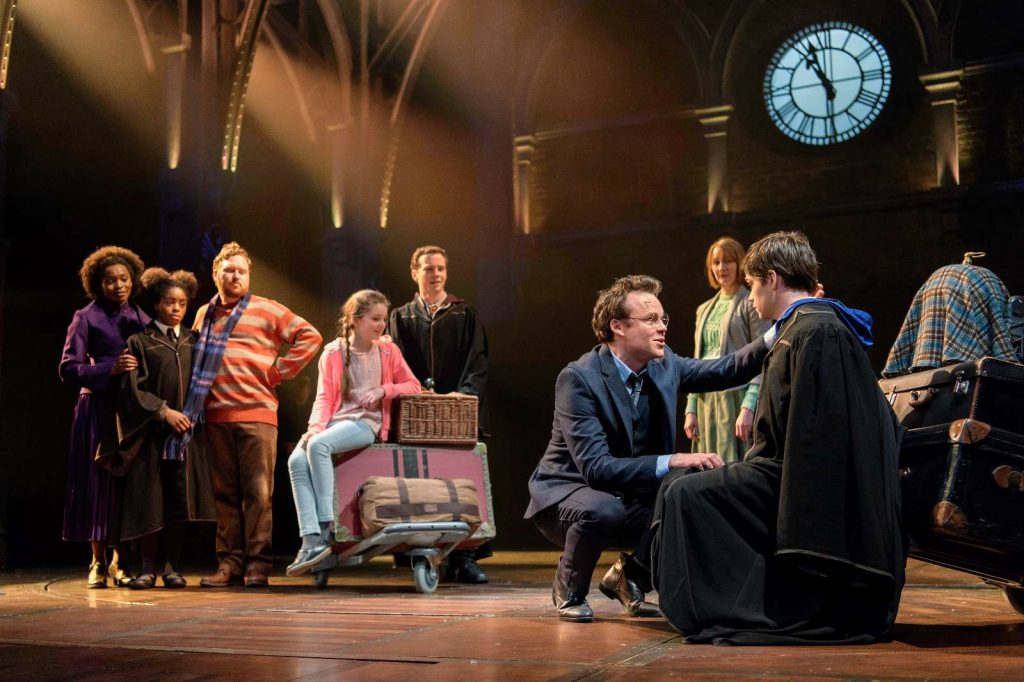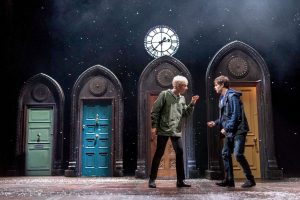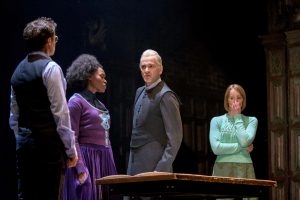Lesley Sharp and David Morrissey provide laughter and emotion in Jack Thorne’s family drama
[usr=5]
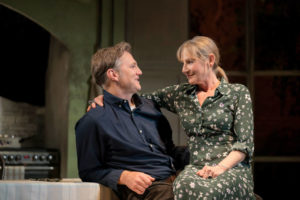
It’s a world away from Jack Thorne and John Tiffany‘s last collaboration- Harry Potter And The Curse Child– but the end of history is another moving drama about parent child relationships.
The title may refer to a book by Francis Fukuyama which around 1990 declared that, with the fall of communism in eastern Europe, liberal democracy had triumphed and its flag would fly forever and a day.
It’s 1997 and we meet Sal and David, two lifetime left wing socialists who perhaps can longer expect radical change. A clue is they’re not happy that Blair, leader of their party, has become prime minister. It may even be significant that they came from hard Manchester and now live in soft Berkshire.
Their three kids are in their late teens and early twenties. The oldest Carl is bringing his new girlfriend Harriet to dinner. She is the daughter of a rich father who owns hotels and service stations. Sal is as fascinated by the privileged as she hates the liberals. She talks too much and in a very frank way. In fact Lesley Sharp’s unfiltered talking when she’s nervous is hilarious. ‘No talent when it comes to cooking, she says of herself, but when it comes to pissing off my children – immense talent – Olympian talent.’
Her children are indeed embarrassed by her but they expect to be. But it’s the red parents who seem red faced because their children are not turning out to be radical socialists. A bust up ensues.
We move on ten years. The parents, true to their socialist ideals, take a decision that makes their children feel they have been judged to have betrayed the cause. Leading to another bust up.
All the children are much more their own people now. In fact, one of the joys of this play is how the children mature but are recognisably the same characters. Kate O’Flynn is the hard-edged Polly with a surly bottom lip like a snow plough. Always the best at winning arguments, she has become a cynical corporate lawyer. The less confident Carl, played by Sam Swainsbury, is married to Harriet (Zoe Ball), but not that happily. He has joined the family business. The highly strung youngest Tom, played by Laurie Davidson, remains a misfit with an inferiority complex and is yet to find his way. None of the children have the certainties that characterise their parents.
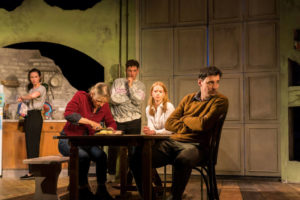
By the end of act two, having experienced a wonderfully funny performance from Lesley Sharp as the mother, I was wondering why an actor of the quality of David Morrissey had been employed to provide a fairly standard dour northern dad. Then came the third act, ten more years on, and he delivered the most moving emotional monologue that explained so much of what formed the parents’ characters and relationship. ‘I thought she was astonishing, she thought I’d do,’ he says.
And the children at something like the halfway stage in their lives see their parents with a new perspective. Not the familiar ‘we just wanted you to be happy’ but something more appropriate to their intellectual rigour.
I don’t want to make this sound too political or philosophical because it is ultimately the story of a family, a believable family. They are loving but they’re not tactile and they’re not sentimental- and neither is Jack Thorne’s script. His dialogue conveys the relaxed banter and the rows of people who love and know one another. The children’s attachment to their parents and its effect on their lives is tangible.
John Tiffany directs with precision. The beautiful design by Grace Smart presents us with a simple family kitchen but with holes in the walls, perhaps suggesting the uncertainties of their lives.
A word of warning. In the middle of one argument, Sal says, ‘I’m going to the toilet. It’s an a political act.’ This is a particularly cruel thing to say in front of an audience who have to sit with their legs crossed through one hour fifty minutes without an interval.
the end of history can be seen at The Royal Court Theatre until 10 August 2019. Click here for tickets.
Watch the YouTube review of end of history on the One Minute Theatre Reviews channel
